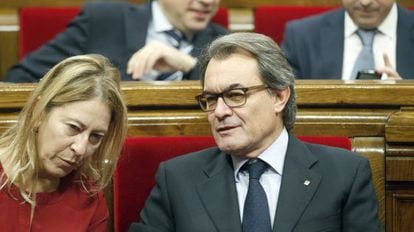What next? The consequences of the Catalan independence motion
The moves expected from both central and regional leaders after passing of breakaway bill

The Spanish government will on Wednesday turn to the Constitutional Court to challenge the historic motion that the Catalan parliament passed on Monday to begin the process of breaking away from Spain.
This should automatically lead to a provisional suspension of the separatist motion while the court considers the appeal.
But that is not likely to stop the acting government of Artur Mas from working to draft three new laws aimed at creating the foundations of an independent Catalan republic.
The central government will try to identify specific individuals who could be held accountable for a disobedience scenario
The separatist motion, which got parliamentary approval with 72 votes in favor and 63 against, specifically says that the Constitutional Court no longer has legitimacy to rule on Catalan affairs, and can thus be ignored.
Instead, the text gives regional lawmakers 30 days to draft three laws creating a new Catalan constitution, a new social security system, and a Catalan treasury.
The separatist coalition Junts pel Si – which comprises Mas’s Democratic Convergence of Catalonia party, the Catalan Republican Left and pro-independence groups – together with the anti-capitalist CUP party say they will press on with the three bills regardless of whether the separatist motion gets placed on hold by the Constitutional Court.
What does disobedience entail?
If, as expected, the Constitutional Court puts a temporary stay on the separatist motion, and Catalan officials choose to ignore it, the latter could be guilty of disobedience – an unprecedented scenario that the Spanish government, the Constitutional Court and the judiciary in general would have to deal with.
What will Prime Minister Mariano Rajoy do?
The central government will try to identify specific individuals who could be held accountable for a disobedience scenario. Catalan parliament speaker Carme Forcadell, who bent internal regulations to allow the separatist motion to reach the floor, is at the center of this strategy. She could face attempts to have her removed from office if she is viewed as not doing enough to stop the wheels that have been set in motion. But Forcadell, the former leader of pro-independence association, the Catalan National Assembly, is not likely to stand in the way of the separatist drift.
Other high-ranking officials could also be targeted, including, ultimately, Artur Mas – who is already dealing with charges of disobedience derived from the informal referendum on self-rule held a year ago.
Which laws will be ignored?
Besides the generic call to only obey laws issuing from the Catalan parliament, the separatist motion specifies some national laws that would cease to be applicable, and other Catalan laws that would be observed even though they have been appealed by the central government.
These include a law guaranteeing gas, electricity and water supply to low-income citizens, and another law ending the three-month wait before foreign citizens can receive a card providing access to the public healthcare network.
The motion also opens the door to ignoring the latest Spanish education law, as Catalan authorities attempt to cement their Catalan-language school program.
English version by Susana Urra.










































